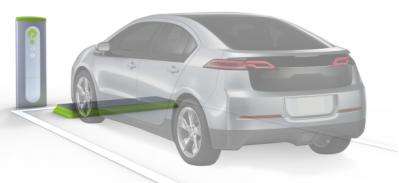July 30, 2010 report
Plugless Power soon to arrive for electric and hybrid vehicles

(PhysOrg.com) -- Evatran, a company from Virginia in the US, has developed a working prototype of a plugless induction charger for electric and hybrid vehicles, and demonstrated the system at this week’s Plug In conference in San Jose, California.
To recharge a vehicle’s battery using the system, the vehicle parks at a Plugless Power station over a floor-mounted parking block, which automatically aligns itself with a special adapter fitted to the vehicle and begins charging. There is no flow of electricity between the vehicle and parking block and no plugs or cables.
The system operates by electrical induction, which is the principle behind the electrical transformer. In this process electrical current flowing into a primary source produces a flow of current into a secondary source, without using plugs or cords. Induction charging provides the convenience of wireless “hands-free” charging, but the down side is that power loss during charging can reach 20 percent. Evatron says the system is 80 percent efficient at the moment, but hopes to reach 90 percent efficiency by the time production units are released.
The system has three major components: an adapter fitted on the vehicle, a parking block, which is a long flat pad on the ground underneath the vehicle at the charging station or in the garage, and a control tower plugged into the grid. Essentially, the adapter and parking block form two separated halves of an electrical transformer.
The vehicle adapter and parking block both contain metal coils. When a vehicle parks over the block the coils inside the block move under the guidance of magnetic sensors until they are aligned to within 6-8 cm of the coils in the adapter. The tower converts mains electricity into the correct frequency for the charger to use. When the coils are lined up, electricity in the control tower creates a strong magnetic field in the coils in the parking block, and this induces an electrical current to flow in the coils in the vehicle adapter to charge the batteries.
Induction chargers have been used in portable devices such as mobile phones and electric toothbrushes, and for medical implants, but this is the first time such a system has been tried for electric and hybrid vehicles.
A pilot program will run during 2010, and the final version is expected to be released in April next year. Evatron is inviting pioneer electric and hybrid vehicle owners to join in their field trials.
More information
© 2010 PhysOrg.com



















